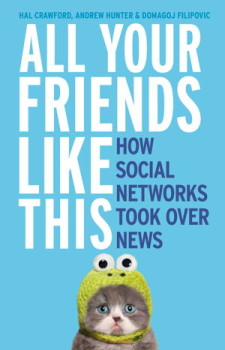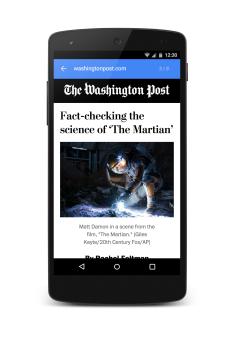Journalists should act more like data marketers, but ranking them is stupid, claims news chief
Journalists should behave more like marketers, the boss of one of Australia’s largest news sites has claimed.

Crawford: Journalists’ leaderboard experiment was ‘just stupid’
Hal Crawford, Ninemsn’s editor-in-chief and publisher, told Mumbrella: “News people have a lot to learn from marketing people, which is a little bit counter-intuitive and maybe a little sacrilegious.” However, he has warned that simplistic rankings of how writers perform is “stupid”.

Crawford’s book: Explains the principles of SENT
Speaking to Mumbrella on the launch of his new book All Your Friends Like This, co-written with Domagoj Filipovic and Andrew Hunter, Crawford said publishers should draw on the analytical thinking already applied by marketers to what works.
The book is a distillation of the trio’s thinking about how news content is shared socially, and follows on from their blog Share Wars. This includes identifying what defines the most shareable content. “The principles of SENT – simple, emotional, new and triggered – are a generalisation of a lot of different work that has gone into thinking about what makes things be passed on,” Crawford said.
“You can use them if you have two stories side by side and you want to know which will be more shared. In general, you’re right.”
“The most useful stuff we found in terms of prediction was a lot of work marketers had already done and we could take that and take our own knowledge and apply it to the news sphere.”
However, what the public think they want, and what the actually click on are two different things, Crawford warns.
“The discrepancy between people’s behaviours and what they say they want is large,” he said. “What people say they want is actually very highly relevant, it’s totally valid and their behaviour is totally valid.
“We have to aspire. And on top of that you have to say ‘OK, what do I want to do? What do I want to publish?’, it’s infinite.”
However, although analytics are important, Crawford warned against setting journalists simplistic targets.
He said: “It’s not new to have journalists really accountable for the audience that they generate. “You have to do that in a way that isn’t too granular, that you get really boring and bad stories and a terrible mix on your page. You’ve got to do it in a really smart way. You have to experiment.”
You can listen to the full interview with Crawford by clicking on the above link.
Last month Crikey revealed Fairfax journalists at both The Sydney Morning Herald and The Age will be given weekly updates on how their stories are tracking online after “personalised dashboards” were rolled out. In May, Mumbrella revealed a ranking of the top scoring journalists on Fairfax’s Australian Financial Review.
However, Crawford said that Ninemsn’s own experiment with leaderboards of people who wrote the most shared articles has been a failure. “I thought it would work but it doesn’t really work,” he said.
“It was just stupid and even within its stupidity it didn’t work,” Crawford said, explaining Ninemsn even invested in the “Shareable Cup”, a trophy designed to reward the journalist with the most shareable content.
“Within a newsroom there should be more of a collegiate feeling than a competitive feeling,” he said.
“What I would want my journalists competing with is something external. There’s a certain amount of healthy competition in a newsroom to break stories.
“Ranking people on a minute by minute basis is probably noxious for the culture of your newsroom,” he added.
Crawford said journalists should be accountable for writing copy that engages an audience.
“Maybe you should look at their performance every three months and aggregate it that way,” he said.
Crawford’s book explores how the media industry evolved its understanding of how to generate audiences over the last 15 years. The process went from simply writing click-friendly stories about the likes of Britney Spears to crafting content that people will be keen to pass on to friends.

Google’s AMP project – will speed up the mobile web
And he predicted that the next shift will be driven by the likes of Facebook’s Instant Articles, the Apple News app, and Google’s Accelerated Mobile Pages.
Instant Articles and Apple News are yet to launch in Australia. “I don’t know how exactly it will change things. They’re really important developments,” he said.
When asked if the launch of these new distribution platforms risk taking control out of the hands of publishers, Crawford said “I would say there is risk involved in anything, particularly if one of those platforms becomes absolute dominant in the news arena.
“You’ve got to ask yourself, what is the exact situation anyway in terms of the traditional publishers and the amount of control they wield over their platforms?”
Miranda Ward
Hal Crawford is speaking at next week’s Publish Conference on the future of news. He will be joined on the panel by Buzzfeed Australia editor Simon Crerar, News Corp Australia group director of editorial Campbell Reid, Fairfax’s Australian Publishing Media group director of news and business media Sean Aylmer. For further information on the program and how to buy tickets click on the banner below.



This kind of thinking encourages a race to the bottom as far as journalism goes – the problem with sites like Daily Mail et al is it lacks any nuance.
The pressure on journalists to get a certain number of shares, likes etc means the stories with the lowest common denominator get the most attention because people share mainly dumb, entertaining stories on social.
You CAN have your cake of quality content with the sharing icing and eat it too – but unfortunately most editors at these populist news organisations have no interest in pursuing it as it requires more thought and more talented journalists instead of the millenial-powered crap filling most news sites today.
Thank God we have a local edition of The Guardian to keep me informed.
What Ian said!
“However, what the public think they want, and what the actually click on are two different things, Crawford warns.”
What they click on and what they will pay for are also two different things, which is a lesson Fairfax needs to learn very quickly if it plans to rely on online subscription revenue.
How low can they go! More Kardashian crap and naughty pussy cat pics please.
Oh Dear Lord Baby Jesus, God help us if “being shared” is the measure of success it completely undermines journalism. I imagine the audience sharing content on social networks are generally younger therefore the content would eventually end up alienating an audience that they might have, that don’t share. Surely things like time on page also count for something and optimising the “related content” links to generate more page views would be more worthwhile (rather than optimising to “shares”) and please stop using outbrain with click bate titles like” top 10 nipple slips from a news desk”. You are in this field to educate and inform, entertaining is becoming too much of a priority on news sites.
Journalists should broadcast the facts and both sides of a story clearly and without bias.
In the current world of online media buying there is little consideration for the quality of the content of the site. Programmatic trading (by and large) commoditises inventory to such an extent that there is little to no benefit to a publisher in employing high quality journalists to produce great quality content as any accompanying inventory may just get lumped in with catsndogs.com etc etc and sold at rock bottom rates through the trading desks.
Whilst there is an opportunity for publishers to sell that inventory on an IO basis, we all know that this method of trading is declining rapidly, despite the fact it remains the best way of advertising in context and in a Brand Safe environment
Even in an IO based sale CPMs are often the deciding factor in where the advertising is placed and if a Rep demanded a higher CPM due to a sites Quality they would get short shrift (or simply get knocked of the schedule without any feedback)
With buying like this, it is increasingly difficult for quality publishers to make a profit, yet click bait / low quality news that is easy to create / copy will thrive.
Many of the current problems facing the online industry (ad blocking, Viewability, declining in quality of content, fraud) are problems of our own making due to the way the “Wild West” was set up…the industry needs a Wyatt Earp and fast.
I can only suggest people read Hal’s book – it’s quite brilliant and I can’t wait to finish it. I shall be more learned. Then I’ll head for the local and reflect with others over a beverage on what can be done to further journalism when we’re in the middle of Raymond Williams’s commercial media model.
Then I’ll read an article on Snapchat.
Unfortunately cat videos are more scalable than quality reporting.
Let’s be honest the majority of people are zombies that would rather read a Kardashian click bait story instead of a quality journalism piece that would make them think.
There’s a whole generation coming through that won’t even know any better.
We are doomed!
Hit the nail on the head No Idea.
You can write the most exciting news, but people are too busy watching cat videos.